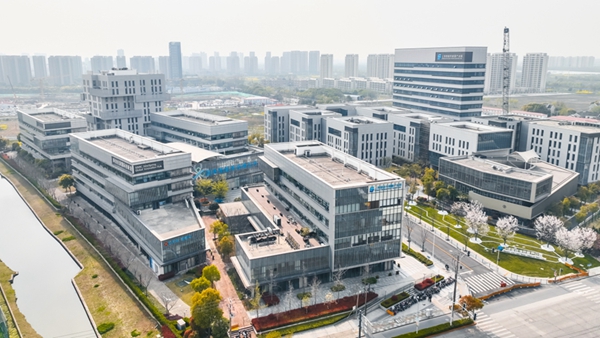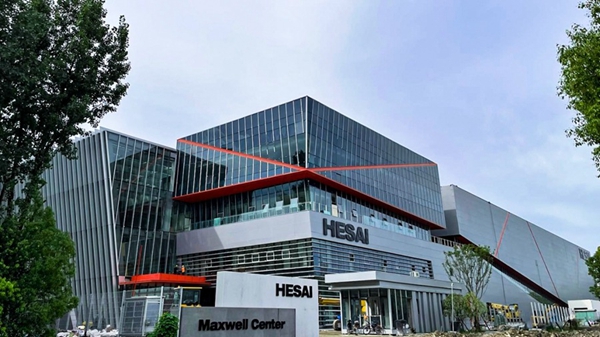
An aerial view of Shanghai Intelligent Sensor Industrial Park located in Jiading district. [Photo provided to english.shanghai.gov.cn]
Jiading district, a major industrial hub and manufacturing powerhouse in Shanghai, is focusing on the development of three 100-billion-yuan ($13.7-billion) level industries: automotive, integrated circuits, and healthcare.
This commitment to innovation was showcased at a meeting held in Jiading district on Dec 27, where representatives from the district government, industry leaders, and research institutions gathered to discuss the latest advancements and future plans for these key sectors.
Automotive: Driving toward a smart and sustainable future
In the automotive sector, the district is prioritizing the "four new modernizations" - a term that encompasses the integration of electric vehicles, intelligent vehicles, shared mobility, and connected vehicles.
Jiading is home to over 4,000 companies across the automotive industry supply chain, including more than 600 companies related to the "new four modernizations".
It also boasts more than 200 public and corporate research and development platforms for the automotive industry, including 24 national and municipal public service platforms.
From January to November, the total output of the automotive "new four modernizations" industry reached 243.32 billion yuan, a year-on-year increase of 6.1 percent.
The target output is 300 billion yuan by 2025.
Speaking at the event, Sun Wenting, a representative from Hesai Technology, a leading lidar company based in Jiading, highlighted the crucial role of light detection and ranging technology in the evolution of autonomous driving.
"Lidar serves as the 'eyes' of robots and vehicles," explained Sun. "By directly scanning and perceiving the 3D environment, lidar can prevent accidents and ensure safe intelligent driving, especially in low-light or complex lighting conditions."
Hesai's success, marked by its global market leadership in automotive lidar, is a testament to Jiading's supportive environment for technological advancements.
Integrated circuits: Powering innovation in a data-driven world
Jiading is strategically focusing on two key areas within the integrated circuit industry: automotive semiconductors, represented by automotive electronics, and intelligent sensors, represented by MEMS, or micro-electromechanical system.
The district is home to a thriving ecosystem of companies operating across the entire integrated circuit value chain, from materials and equipment to chip design, manufacturing, and product development.
Shanghai Industrial Technology Research Institute (SITRI), an innovation incubation platform in Jiading, plays a crucial role in accelerating the development of "More than Moore" technologies. This concept goes beyond merely making computer chips smaller and faster, aiming to enhance their functionalities.
"SITRI has successfully developed five major categories and over 20 sets of standard processes for intelligent sensor chips, including environmental, acoustic, and inertial sensors," said Dong Yemin, general manager of SITRI.
From January to November, the total output of the integrated circuit industry reached 85.43 billion yuan, a year-on-year increase of 2.4 percent. The target output is 100 billion yuan by 2025.
Life sciences: Advancing healthcare through technological breakthroughs
Jiading is committed to becoming a leading center for the life sciences industry, with a particular focus on high-performance medical equipment and devices, as well as precision medicine.
The district is home to a strong cluster of over 120 companies, each with an annual revenue of more than 20 million yuan, engaged in the production, R&D, and services related to life sciences. It also has seven listed companies in the sector.
From January to November, the total output of the life and health industry reached 32.29 billion yuan, a year-on-year increase of 3.7 percent. The target output is 50 billion yuan by 2025.
Apactron, a leading developer of particle therapy systems, showcased its groundbreaking achievements in developing China's first domestically produced proton therapy system.
"Apactron's proton therapy system has successfully entered clinical use and completed over 400 treatments with positive results," said Li Rui, deputy general manager of Apactron.
He emphasized that the system's affordability, costing 100,000 yuan less per treatment course than similar imported devices, makes this advanced cancer treatment technology accessible to a wider patient population within China.
Shaping the future of industries

Hesai Technology's Maxwell Center, a sprawling 52,000-square-meter facility in Jiading Industrial Zone, houses state-of-the-art automated lidar production lines, testing centers, and labs. [Photo provided to english.shanghai.gov.cn]
Jiading district is not only fostering the growth of these key industries but is also actively shaping the future by investing in emerging sectors such as new energy storage, low-altitude economy, and artificial intelligence.
Its commitment to building a robust industrial ecosystem is attracting investments and driving the creation of high-quality jobs.

